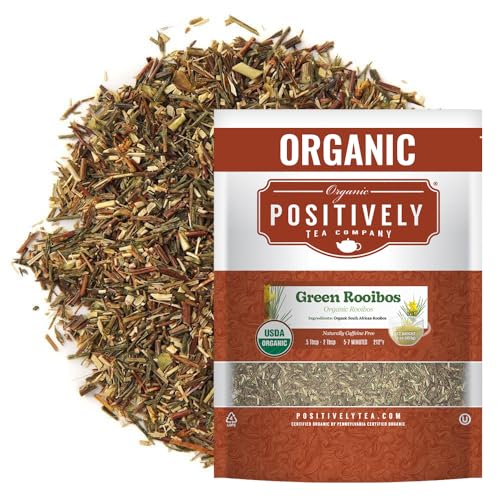African Teas 101: A Comprehensive Guide to African Teas
This post is about African teas.

This post about non toxic electric tea kettle may contain affiliate links, which means I’ll receive a commission if you purchase through my link, at no extra cost to you.
Africa, a continent renowned for its diverse cultures and landscapes, is also a treasure trove of exquisite teas. From the sun-kissed slopes of Kenya to the misty highlands of Malawi, African teas offer a unique and flavorful experience that reflects the essence of their origins. Join us as we embark on a journey through the lush plantations and ancient traditions that shape the diverse tapestry of African teas.
Unveiling the Rich Tapestry: A Historical Exploration of African Teas
Tea, a beverage celebrated worldwide, has an intricate history woven into the cultural fabric of Africa. While often overshadowed by the tea traditions of Asia and Europe, Africa boasts a diverse and fascinating tea heritage that spans centuries.
Ancient Beginnings:
The origins of African tea cultivation can be traced back to ancient times. Historical records suggest that indigenous communities in regions such as Malawi and Kenya were familiar with the use of local herbs and plants for medicinal and ritualistic purposes. These early infusions laid the groundwork for what would later evolve into the vibrant world of African teas.
Colonial Influence:
The colonial era played a significant role in shaping the landscape of tea cultivation in Africa. British colonizers, in particular, introduced tea plantations to countries like Kenya and Malawi during the late 19th and early 20th centuries. The favorable climate and fertile soils proved ideal for tea cultivation, giving rise to the establishment of thriving tea estates.
Kenyan Pioneers
Kenya, in particular, emerged as a key player in the African tea scene. The commercial cultivation of tea in Kenya began in the early 1900s, and the industry rapidly expanded. Today, Kenya is renowned for its robust black teas, characterized by bold flavors and brisk profiles. The tea estates in regions like Kericho and Nandi Hills contribute significantly to Kenya’s status as one of the leading tea producers in Africa.
Rooibos Revolution:
While traditional tea (Camellia sinensis) has a notable presence in certain African countries, the continent is also home to unique herbal infusions. Rooibos, or red bush tea, hails from South Africa and has a history deeply rooted in the indigenous Khoisan communities. The processing and commercialization of rooibos began in the early 20th century, and today, it stands as a caffeine-free and antioxidant-rich alternative with a distinctively sweet and earthy flavor.
Most Common African Teas
Kenyan Black Tea:
Nestled in the heart of the Great Rift Valley, Kenya’s tea plantations produce some of the world’s most robust and flavorful black teas. Renowned for their bright color, briskness, and full-bodied taste, Kenyan black teas, such as those from the Kericho region, are a true embodiment of the country’s commitment to quality.
Whether enjoyed with a splash of milk or savored as a bold standalone brew, Kenyan black tea is a testament to the rich terroir of the region.
Health Benefits of Kenyan Black Tea: A Boost of Antioxidants and Heart Health
Kenyan black tea, renowned for its robust flavor, also brings a plethora of health benefits to the table. Packed with antioxidants, including catechins and theaflavins, it contributes to the body’s defense against oxidative stress.
These compounds have been linked to improved heart health by promoting healthy cholesterol levels and supporting cardiovascular function. Additionally, the moderate caffeine content in black tea can provide a gentle energy boost and enhance alertness without the jitters associated with higher-caffeine beverages.
How to Prepare Kenyan Black Tea
- Ingredients: Kenyan black tea leaves, hot water.
- Preparation: Use one teaspoon of loose tea leaves per 8 oz cup. Steep in hot water (just under boiling) for 3-5 minutes. Add milk and sweetener if desired.
Rooibos from South Africa: The Red Bush Elixir
Venture south to the Cederberg Mountains in South Africa, and you’ll discover the wowing rooibos plantations. Rooibos, often referred to as red bush tea, is celebrated for its caffeine-free nature and an abundance of antioxidants.
The infusion of rooibos leaves yields a reddish-brown elixir with a naturally sweet and nutty flavor. Beyond its taste, rooibos is cherished for its potential health benefits, making it a soothing and health-conscious choice for tea enthusiasts.
Health Benefits: Rooibos from South Africa: Naturally Calming and Rich in Antioxidants
Rooibos tea, also known as red bush tea, offers a caffeine-free alternative with a spectrum of health benefits. Rich in antioxidants like aspalathin and quercetin, rooibos may aid in neutralizing free radicals in the body, potentially lowering the risk of chronic diseases.
Rooibos is prized for its calming properties, making it an excellent choice for those seeking relaxation without the stimulating effects of caffeine. Some studies also suggest that rooibos may support healthy skin and digestion.
How to Prepare Rooibos (Red Bush) Tea
- Ingredients: Rooibos tea leaves, hot water.
- Preparation: Use one teaspoon of loose rooibos tea leaves per 8 oz cup. Steep in hot water (boiling) for 5-7 minutes. Rooibos is naturally sweet, but you can add honey or lemon if desired.
Malawi’s White Tea: Elegance in Simplicity
Malawi, the “Warm Heart of Africa,” contributes to the global tea tapestry with its unique white teas. Grown at high elevations, Malawi’s white teas are characterized by delicate leaves and a subtle, nuanced taste. Often hand-harvested and minimally processed, these teas showcase the elegance found in simplicity. Malawi’s white teas offer a serene and refined sipping experience, inviting tea connoisseurs to appreciate the subtleties of flavor in every cup.
Health Benefits: Malawi’s White Tea: Delicate Elegance with Skin-Boosting Properties
Malawi’s white teas, known for their delicate flavor, are minimally processed, retaining a high concentration of antioxidants. These antioxidants, such as catechins, may contribute to promoting skin health by combating oxidative stress.
White tea is also praised for its potential anti-aging properties, helping to maintain youthful-looking skin. The gentle caffeine content in white tea can provide a mild energy lift without the intensity associated with other caffeinated beverages.
How To Prepare
- Ingredients: Malawian white tea leaves, hot water.
- Preparation: Use one teaspoon of loose white tea leaves per 8 oz cup. Steep in hot water (just under boiling) for 4-6 minutes. White tea is delicate, so avoid over-steeping for the best flavor.
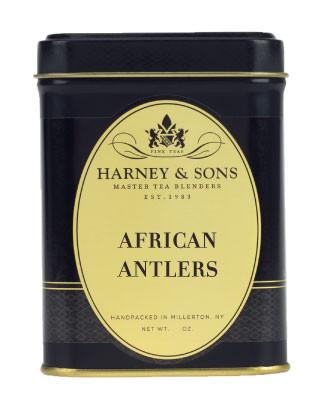
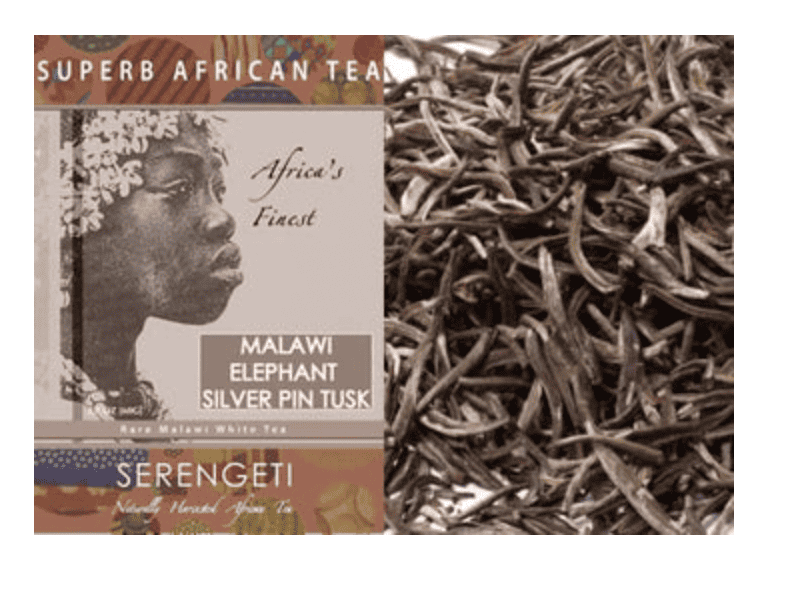
Ethiopian Green Tea: A Glimpse into Ancient Traditions
Traveling to the cradle of humanity, Ethiopia, we encounter the country’s traditional green teas. Steeped in history and cultural significance, Ethiopian green teas are often enjoyed in elaborate tea ceremonies that emphasize community and mindfulness.
The teas, ranging from grassy and vegetal to slightly nutty, reflect the diverse landscapes of this ancient land. Exploring Ethiopian green teas is not just a sip but a cultural immersion into the heart of the nation.
Health benefits: Ethiopian Green Tea: Aids in Metabolism and Weight Management
Ethiopian green tea, steeped in cultural significance, comes with a range of health benefits. Rich in polyphenols, particularly epigallocatechin gallate (EGCG), green tea has been associated with promoting metabolism and supporting weight management efforts.
The antioxidants in green tea may also play a role in enhancing brain function and supporting cardiovascular health. Additionally, the modest caffeine content can contribute to increased alertness and mental focus.
HOW TO PREPARE
- Ingredients: Ethiopian green tea leaves, hot water.
- Preparation: Use one teaspoon of loose green tea leaves per 8 oz cup. Steep in hot water (not boiling) for 2-3 minutes. Green tea can become bitter if over-steeped, so monitor the time closely.
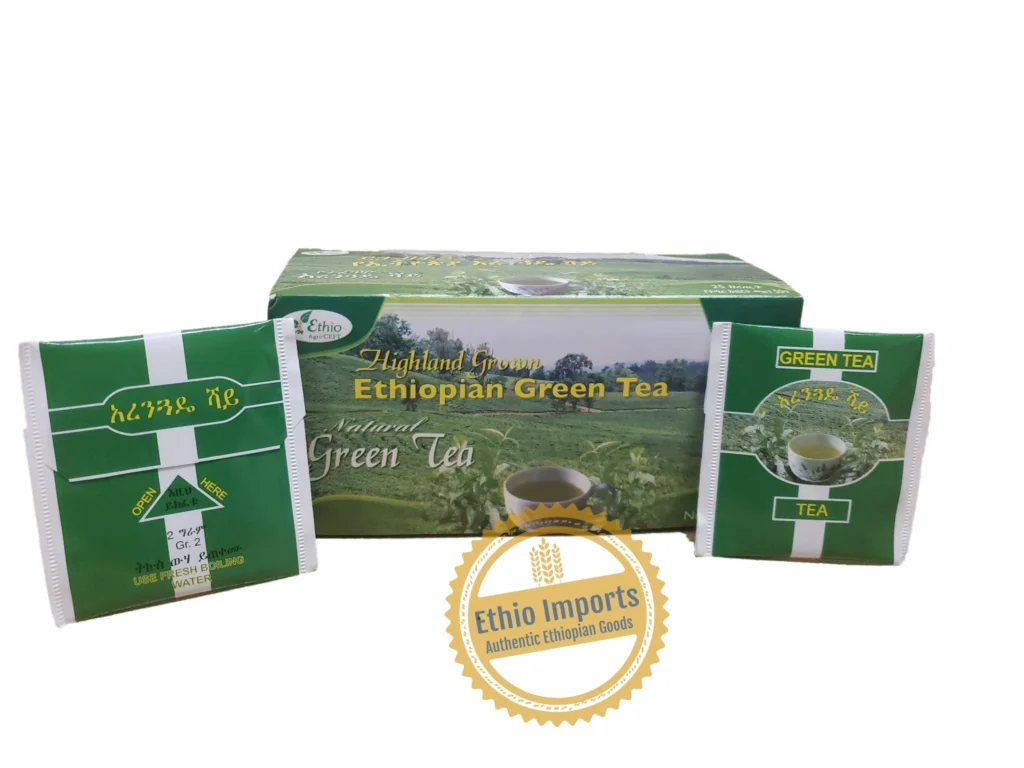
African Chai Blends: A Symphony of Spices and Stories
Chai, a blend of tea and spices, has found its way into the heart of African tea culture. Inspired by Indian masala chai, African chai blends incorporate local spices and herbs, creating a symphony of flavors that dance on the palate.
From the warmth of ginger to the citrusy notes of lemongrass, African chai is a celebration of diversity and a testament to the continent’s ability to embrace and innovate with its tea traditions.
Health Benefits: African Chai Blends: Digestive Harmony and Immune Support
African chai blends, infused with a variety of spices, offer a harmonious blend of flavors and health benefits. Ingredients like ginger, cinnamon, and cloves commonly found in chai blends are celebrated for their digestive properties. Ginger, in particular, has been linked to reducing nausea and inflammation.
The combination of spices may also provide immune-boosting effects, making chai a comforting beverage that supports overall well-being.
HOW TO PREPARE
- Ingredients: African chai blend, hot water, milk, sweetener (optional).
- Preparation: Use one teaspoon of African chai blend per 8 oz cup. Steep in hot water for 4-6 minutes. Add milk and sweetener to taste for a spiced and flavorful chai experience.
Kenyan Purple Tea:
Kenyan purple tea is a unique and visually striking variety produced from the Camellia sinensis plant with leaves that naturally exhibit vibrant purple hues due to anthocyanin antioxidants. Discovered in the early 2000s, this tea cultivar has gained attention for its bold, brisk flavor profile with fruity undertones. With limited production and global interest, Kenyan purple tea offers tea enthusiasts a distinctive and visually appealing addition to the world of specialty teas.
Health Benefits: Purple Wellness: Kenyan Purple Tea’s Health Boost
Kenyan purple tea, with its vibrant hue, brings more than visual allure—it’s a healthful indulgence. Packed with anthocyanins, this tea offers antioxidant strength, potential anti-inflammatory support, and a sip of overall well-being. Enjoy a cup of Kenyan purple tea for a delightful blend of flavor and wellness benefits.
How To Prepare Kenyan Purple Tea
- Ingredients: Kenyan purple tea leaves, hot water.
- Preparation: Use one teaspoon of loose purple tea leaves per 8 oz cup. Steep in hot water just below boiling for 3-4 minutes. Witness the transformation of vibrant purple leaves into a flavorful infusion, ready to be savored for a uniquely delightful tea experience.
South African Honeybush Tea:
South African Honeybush tea, hailing from the southern regions, boasts a naturally sweet and honey-like flavor. Caffeine-free and rich in antioxidants, it offers a comforting and aromatic tea experience.
Health Benefits of South African Honeybush Tea
Known for its potential antioxidant properties, South African Honeybush tea may contribute to overall well-being. Its natural sweetness and lack of caffeine make it a soothing choice for those seeking a gentle and healthful beverage.
How to Prepare:
- Ingredients: Honeybush tea leaves, hot water.
- Preparation: Use one teaspoon of loose Honeybush tea leaves per 8 oz cup. Steep in hot water (boiling) for 5-7 minutes. Savor the naturally sweet and comforting notes, enjoying it as a caffeine-free alternative.
Tanzanian Black Tea
Tanzanian teas, with their unique flavor profiles, are influenced by the country’s diverse landscapes. Ranging from bold and robust to more delicate varieties, Tanzanian teas offer a delightful exploration of East African tea traditions.
Health Benefits:
While Tanzanian teas share common benefits with other black teas, including potential antioxidant support, the specific characteristics of each variety contribute to a diverse tea experience.
How to prepare:
- Ingredients: Tanzanian tea leaves, hot water.
- Preparation: Use one teaspoon of loose tea leaves per 8 oz cup, adjusting for specific varieties. Steep in hot water (just under boiling) for 3-5 minutes, allowing the flavors to develop. Enjoy the rich and varied tastes of Tanzanian teas.
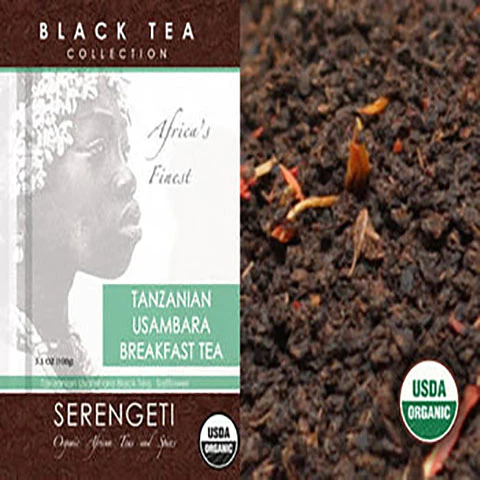
African Green Rooibos:
African Green Rooibos is the less oxidized cousin of traditional red rooibos. It offers a milder flavor with herbal and slightly sweet notes, making it a refreshing and caffeine-free option.
Health Benefits:
Green Rooibos shares similar potential health benefits with red rooibos, including antioxidants that may support overall health. Its caffeine-free nature and gentle taste make it suitable for all-day enjoyment.
How to prepare:
- Ingredients: African Green Rooibos leaves, hot water.
- Preparation: Use one teaspoon of loose Green Rooibos leaves per 8 oz cup. Steep in hot water (not boiling) for 2-3 minutes. Embrace the delicate and herbal notes for a soothing cup of caffeine-free goodness.
African Yellow Teas:
African Yellow Teas represent a lightly oxidized category falling between green and oolong teas. Known for their nuanced flavors, these teas offer a unique and diverse tea-drinking experience.
health Benefits:
While sharing similarities with both green and oolong teas, African Yellow Teas provide potential antioxidant support and a moderate caffeine content. The specific characteristics vary among different varieties.
HOW TO PREPARE:
- Ingredients: African Yellow Tea leaves, hot water.
- Preparation: Use one teaspoon of loose tea leaves per 8 oz cup. Steep according to the recommended time and temperature, typically ranging from 2-4 minutes. Enjoy the balanced flavors of African Yellow Teas.
Malawian Oolong Tea:
Malawian Oolong Tea represents a unique offering from the region, showcasing the diversity of Malawi’s tea production. With characteristics falling between green and black teas, Malawian Oolong is prized for its nuanced flavors.
Health Benefits:
Oolong teas, including Malawian Oolong, may provide a balance of antioxidants and moderate caffeine. Its potential benefits align with those attributed to both green and black teas.
How to Prepare:
- Ingredients: Malawian Oolong Tea leaves, hot water.
- Preparation: Use one teaspoon of loose tea leaves per 8 oz cup. Steep according to the recommended time and temperature, typically ranging from 3-5 minutes. Experience the intriguing taste profile of Malawian Oolong Tea.
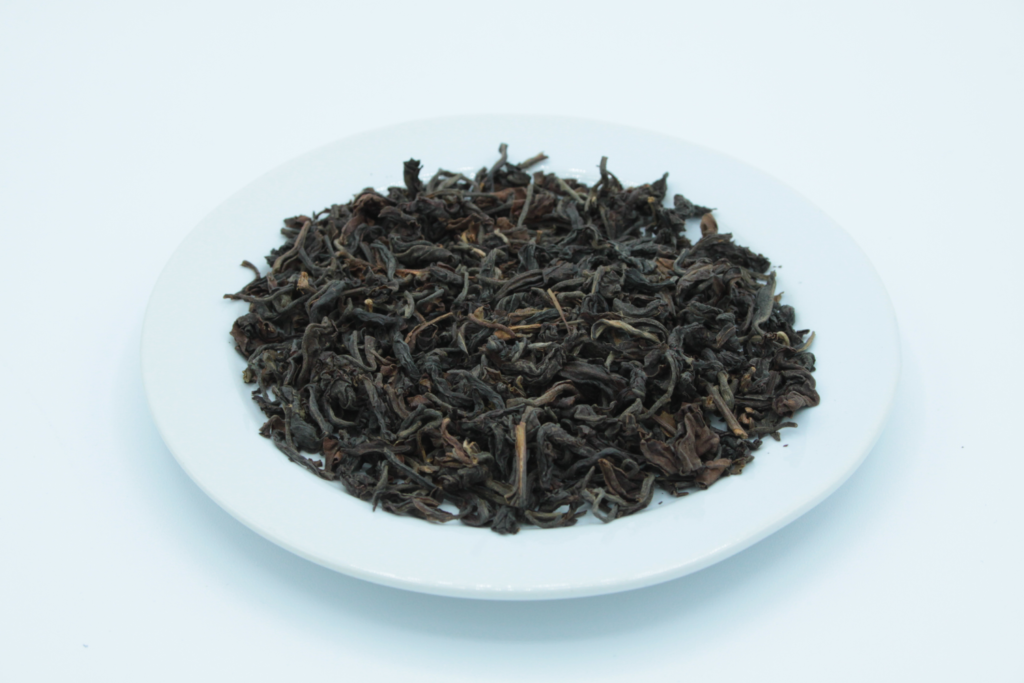
Sustainability in African Tea Growing & Production
The sustainability of African teas varies depending on the region, plantation practices, and the commitment of individual producers to environmentally friendly methods. In recent years, there has been a growing awareness of the importance of sustainability in the tea industry, and many African tea producers are adopting more eco-friendly and socially responsible practices.
Some key points to consider regarding the sustainability of African teas:
Organic and Sustainable Certifications:
Some tea plantations in Africa have obtained organic and sustainable certifications. These certifications ensure that the teas are grown without synthetic pesticides or fertilizers, follow environmentally friendly practices, and often involve fair labor practices.
Community Involvement:
Many African tea producers are engaging in community-driven initiatives that focus on the well-being of local communities. This includes fair wages, educational programs, and healthcare initiatives.
Eco-Friendly Farming Practices:
Some tea estates in Africa are adopting eco-friendly farming practices, such as natural pest control, water conservation, and soil management techniques. These practices not only contribute to environmental sustainability but also enhance the quality of the tea.
Ethical Sourcing:
Tea companies and brands sourcing African teas may have their own sustainability initiatives. Look for companies that transparently communicate their commitment to ethical and sustainable sourcing, as this indicates a conscientious approach to the environmental and social impact of their products.
Industry Initiatives:
There are industry-wide initiatives and organizations working towards promoting sustainability in the tea industry globally. These initiatives often collaborate with tea-producing regions, including those in Africa, to implement best practices that prioritize environmental and social responsibility.
While progress is being made, it’s essential to recognize that sustainability practices can vary widely among tea producers. Consumers interested in supporting sustainable practices should look for certifications, inquire about the sourcing practices of the tea brands they choose, and support initiatives that promote fair trade and environmental stewardship in the tea industry.
Benefits of African Teas Over Other Types of Tea?
African teas offer a unique set of characteristics and benefits that distinguish them from teas produced in other regions. Here are some notable advantages of African teas:
Rich Terroir:
The diverse climates and landscapes across Africa contribute to a rich terroir, influencing the flavor profiles of teas. From the high elevations of Kenya to the mountainous regions of Malawi, the terroir imparts distinct and complex flavors to African teas.
Diverse Varieties:
Africa is home to a wide range of tea varieties, including robust black teas, delicate white teas, and caffeine-free herbal infusions like rooibos. This diversity provides tea enthusiasts with a broad spectrum of flavors and options to explore.
Health Benefits:
Each type of African tea comes with its own set of health benefits. For example, rooibos is rich in antioxidants and caffeine-free, making it suitable for those seeking a health-conscious, caffeine-free option. Green teas from regions like Ethiopia offer potential metabolism-boosting properties.
Innovative Blends:
African teas are often used as the base for innovative blends, including chai teas infused with a variety of spices. These blends showcase the creativity of African tea producers and offer a unique twist to traditional tea recipes.
Community-Focused Initiatives:
Many African tea producers are actively engaged in community-focused initiatives. Ethical and fair trade practices, educational programs, and healthcare initiatives contribute to the well-being of local communities, fostering sustainable and positive development.
Sustainability Practices:
There is a growing awareness of sustainability in the African tea industry. Some producers are adopting eco-friendly farming practices, emphasizing organic cultivation, and participating in initiatives that promote environmental stewardship.
Cultural Significance:
Tea plays a significant role in the cultural traditions of several African countries. From elaborate tea ceremonies in Ethiopia to the social aspects of tea-drinking in countries like Kenya, the cultural significance adds depth and meaning to the tea experience.
Unique Processing Methods:
African teas may undergo unique processing methods, contributing to their distinct characteristics. For example, the white teas of Malawi are minimally processed, preserving the delicate flavors and aromas of the tea leaves.
Artisanal Craftsmanship:
Some African teas are produced using traditional, artisanal craftsmanship. Hand-picking and hand-processing techniques contribute to the high quality and authenticity of these teas.
Global Recognition:
African teas are gaining recognition on the global stage, with a growing appreciation for their unique qualities. The recognition helps promote the sustainability efforts and the cultural significance of African tea-producing regions.
While the benefits of African teas are subjective and dependent on personal preferences, these characteristics collectively contribute to the appeal and growing popularity of African teas in the global tea market.
Negative Aspects of African Teas
While African teas have many positive attributes, it’s essential to acknowledge some challenges and potential drawbacks associated with the tea industry in certain regions of Africa. Here are some of the negatives:
- Environmental Concerns: Some tea plantations in Africa may face environmental challenges, including deforestation and the use of chemical pesticides. Unregulated practices can contribute to habitat loss and impact the overall biodiversity of the region.
- Labor Issues: Labor conditions on tea estates can vary, and in some cases, there have been concerns about fair wages, working conditions, and labor rights. Ensuring fair labor practices across the entire supply chain can be a challenge.
- Limited Organic Certification: While there are organic tea producers in Africa, not all tea plantations have obtained organic certification. This can limit the availability of certified organic options for consumers seeking teas produced without synthetic pesticides or fertilizers.
- Access to Education: In some tea-producing regions, access to education may be limited. This can impact the well-being and opportunities for the communities involved in tea cultivation.
- Market Challenges: African teas face competition in the global market, often dominated by teas from Asia. Limited market access and awareness can make it challenging for African tea producers to promote their products and receive fair prices.
- Climate Change Impact: Climate change poses a significant threat to tea production globally, including in African regions. Shifts in weather patterns, unpredictable rainfall, and rising temperatures can affect tea yields and quality.
- Dependency on Commodity Prices: Many tea-producing regions in Africa are dependent on global commodity prices. Fluctuations in tea prices can impact the economic stability of these regions, affecting both producers and local communities.
- Infrastructure Challenges: Some tea-producing regions may face infrastructure challenges, affecting transportation and processing facilities. Limited infrastructure can impact the efficiency of tea production and export.
- Limited Value-Added Processing: While there are innovative tea blends and unique varieties, some regions may face challenges in value-added processing. This limits the diversification of tea products and may impact the overall competitiveness in the market.
- Quality Consistency: Ensuring consistent quality can be a challenge in the tea industry. Factors such as weather conditions, pest infestations, and processing methods can influence the taste and quality of the final product.
It’s important to note that these challenges are not universal across all African tea-producing regions or plantations. Many producers are actively working to address these issues through sustainable and ethical practices, community initiatives, and increased awareness of environmental and social responsibilities.
As consumers, being informed about the sourcing practices of the teas we choose can contribute to positive change in the industry.
Conclusion: African Teas
In conclusion, the world of African teas is a captivating journey through diverse landscapes, rich cultures, and centuries-old traditions. From the bold black teas of Kenya to the nuanced oolongs of Malawi, each cup tells a story of heritage and craftsmanship. Embracing the vibrant hues, unique flavors, and potential health benefits, African teas invite enthusiasts on a sensory adventure.
Whether you savor the robustness of Kenyan purple tea or the herbal notes of South African Honeybush, each infusion is a celebration of Africa’s contribution to the global tea tapestry. As we raise our teacups to the continent, let us cherish not only the leaves but the cultural legacy and flavors that make African teas a truly extraordinary experience. Cheers to the boundless possibilities steeped in every sip!
If you’re interested in sampling different types of African teas and also care about sustainability and the tea being ethically sourced, I highly recommend you check out the Just Tea brand. The teas are all grown in Africa, fair trade, and ethically sourced. They have amazing flavor blends of traditional African tea.
This post was about African teas.
Favorite Non-Toxic Tea Kettles For African Teas
Favorite Non-Toxic Tea Pots For African Teas
Favorite Non-Toxic Loose Tea Infusers For African Teas
Favorite Non-Toxic Tea Accessories
More posts like this…
Brewing Wellness: The Ultimate Adaptogen Tea Guide
Choosing an Electric Kettle, No Plastic Allowed!
The Ultimate Guide to the Borosilicate Glass Tea Kettle
How to Choose the Healthiest Kettle to Boil Water In
The Ultimate List of Non Toxic Tea Kettle Options
The 11 Best Non Toxic Electric Tea Kettle Options
Favorite Health Posts
Favorite Posts
Last update on 2026-02-11 / Affiliate links / Images from Amazon Product Advertising API
This product presentation was made with AAWP plugin.











